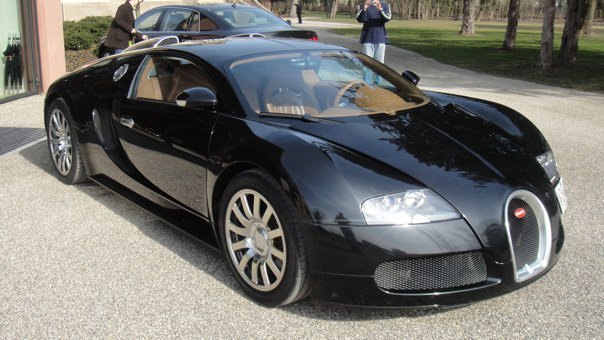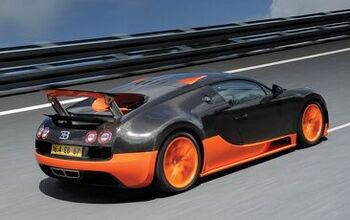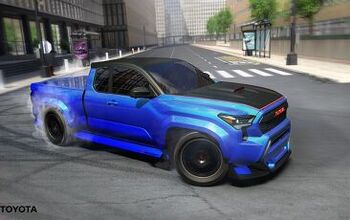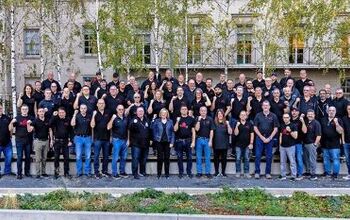Review: 2010 Bugatti Veyron 16.4
I didn’t drive the Bugatti Veyron, but here you are reading my review. So how exactly did an automotive journalist with zero manufacturer connections, and no income (at the time) aside from menial paychecks as a drum instructor get the nerve to write a Veyron review?
“SOLD…to the gentleman by the staircase!” bellowed the auctioneer, before everyone applauded the winner of the night’s ultimate charity prize: a trip to Bugatti central for a factory tour and a full day of seat time in the Veyron. As I stood next my brother, who was still in shock from being that high bidder, I knew he’d once again give TTAC a taste of the high performance combined with the brilliantly decadent. But, over a year later, the good Dr. Mehta is still busy beating cancer into remission. And we’re running out of time before the Veyron slips into the history books.
Luckily, he was kind enough to being me along.
We embarked on the same Bugatti Experience as a potential customer: meals, drinks, snacks and facility tour complete with a PowerPoint presentation. The overview discussed the original Veyron design mule, pre-VW intervention. Imagine the current Veyron except with flatter curves, a look more in tune with Bugattis of the past and less like a VW New Beetle on steroids. Not that the Veyron is plump and derivative. But like a Rubenesque C5 Corvette, there are too many round elements fighting for your attention.
Whatever. The interior doesn’t disappoint: suitably luxurious carpets, leather soft/aromatic enough for its price point and sheets of Alcantara giving the impression of sitting inside in a gigantic piece of tiramisu. The dashboard is a slice of heaven, framed by metal trim that doesn’t attract attention to itself, letting the center stack’s engine turned aluminum receive the praise it deserves. The air registers feel precise enough to come from a defense contractor’s machine shop. The Burmester Audio system possesses the sound clarity, imaging quality and simplistic ergonomics of exquisite audio engineering: Herr Burmester even claims he was involved in the monocoque’s design from the early stages.
The Veyron’s other electronic distractions impress, mostly because of their limited real estate and flat learning curve. If a Rothko takes several minutes to make an indelible impression, the every interior subsystem in the Bugatti is crafted with the same thought. But thoughts get rather simplistic when three large needles on the Veyron’s gauge cluster violently–yet effortlessly–swing to the right. And this is where the good Dr. Mehta takes us home.
Sanjay writes:
The first time I buried the throttle after clipping the apex of a tight right hander leading to the back straight, as the quad snailed W16 howled and tried its best to fling me off into the horizon, reality started to sink in….life is pretty damn good.
After my tour of the Bugatti grounds, I met my French date: a solid black Veyron with a delicious caramel leather interior, showing 33,000 km on the clock. The staff informed me that this car had been driven, and driven hard. But aside from a few rock chips and worn leather on the keyfob (that looked suspiciously like my last VW rental), this Veyron was virtually new.
Settling into the comfy, manually adjustable bucket, (custom sizes available, ‘natch) top-tier craftsmanship was evident everywhere. Retired F1 driver Pierre Henri Raphanel drove me off the Bugatti grounds to a twisty country road, while casually discussing the cars attributes. To illustrate, he came to a complete stop on a two-lane road with a gentle S bend about a hundred yards ahead. While continuing his speech, Pierre floored the throttle. The car lunged forward with the slightest wisp of wheelspin (times 4), hit second gear and negotiated the bend ahead with two fingers casually on the wheel at approximately 80 mph. The entire ordeal took less time and effort than it did for you to read this sentence.
My turn: with a fair bit of time in high powered machinery myself, the Veyron is most notable for its civility and near total lack of traction related issues. I tooled around small villages in the Alsace region, where people peered out of local wineries to get a glimpse of the black Bug at every turn. In this environment, the car felt much like any other stiffly sprung, ground clearance challenged exotic. Despite the 2+ tons of weight, the big Bug is more Lamborghini and less CL65 over city streets. Which is to say, it’s civilized enough, but the ride quality was no better than a magnetic ride equipped 3200 lb Vette.
Aiming at the autoroute, the car settles into a 200 km/h groove in 7th gear like a good German ‘bahn burner, with minimal wind noise or tramlining; however the presence of those huge wheels and Michelin PAX runflats, stiff bushings, and tight Eibachs prevents any AMG-ish pretense of true relaxed cruising. When holes opened up (or even when they didn’t), small throttle openings quickly lead to BIG speed even at low revs, thanks to 4 little lag-free turbos pushing 488 cubic inches. A 997 Turbo in high gear doesn’t stand a chance, but a stock (TVS blown) C6 ZR1 at 2000 rpm would probably have no trouble staying in the rearview mirror. Until the Veyron driver discovers sport mode, that is.
In sport mode, the tach (and adjacent Power Meter) stay resolutely towards the right, keeping the W16QT on full boil until you manually upshift. I easily saw 250+ km/h in between clumps of traffic with the same ease achieved in either my twin-turbo Ford GT or Gallardo…
…but this thing is bone stock. On pump gas. With a warranty to boot.
Oh, and it has another 150 km/h in reserve, you know, to dispatch said tuner cars if need be, though I didn’t have the heart to tell Pierre that the turbo Lambo (on race gas @25 psi of boost) would eat this thing alive in midrange acceleration. Not that it mattered anyway: piloting the Veyron is an experience.
We arrive at the track L’Anneau Du Rhin about 45 min after leaving the Molsheim factory. Pierre remains in the passenger seat, instructing me on a wet/dry slalom aimed at demonstrating the AWD and stability control systems. After a few laps, including standing starts and lane changes on wet pavement (with the stability turned off), it’s abundantly clear that the microprocessors can in fact keep all but the most hamfisted clods from getting into trouble.
The real fun began when Pierre coached me through 3 or 4 laps around the short course at progressively higher speeds, realizing I had some seat time on the track before. “Oui, you are good, I cannot earn my paycheck teaching you. Enjoy!” thereby giving me free reign to lap the track, though he reactivated the nannies. Frankly, that’s fine by me: I had no desire to test the limits of my insurance deductible, and the car has remarkably high yaw thresholds before intervening.
Yes, that means I throttle steered a freaking Veyron! It’s able to change direction like a modern era 300 lb NFL lineman, but its forte is still a straight line: even on the short straightaway, 200+ km/h is doable. Over and over, with the W16 sounding remarkably like a big block pushrod V8 from behind me. Unfortunately, a tight 1st gear right hander at the end of the straight eventually gets the best of even these 15.7″ ceramic discs, and the brake/tire over temp light momentarily forces a pit stop. 1001 hp and 4400+ lbs does not a good track car make.
During the pit stop, the low coolant light again rears its head, and our engineer reads the codes, quickly surmising a leak in the intercooler. He has the carbon fiber rear bodywork off in less than 10 minutes, topping off the intercooler tank with–what else–the same Evian we enjoyed in the pits.
Thirty minutes later, I’m back making hot laps. Now able to settle in a bit more, I notice the steering is extremely communicative, with virtually no discernible torque contamination. The dual clutch gearbox blips the bent sixteen seamlessly, though the gears are so closely spaced, the torque bandwidth so massive, that shifting is rarely necessary.
I remember thinking that I’ve been lapping this 7 figure car for an hour as hard as my C6 Z06, and the tire bill alone for this day was probably greater than what it cost me to put a cam, headers, and tune on my Z. One full set of rubber costs as much as the twin-turbo conversion on a Ford GT!
Finally a few laps with the F1 hot shoe behind the wheel on the long course at Du Rhin, and I am presented with a certificate in a matte aluminum frame commemorating this bucket list worthy experience. Did I mention life is good?
I still had another 45 min stint back to the factory, and I could feel the bond with this Veyron test mule beginning to grow. Momentarily stuck behind a French camion going under 120 km/h, I reflected on the morning’s presentation:
Over breakfast in the Bugatti library, the team gave an overview of the unlikely sequence of events leading to the production of the world’s most outrageous super car of the 21st century, it became clear how unlikely it was that the Veyron would truly see the light of day: over budget and not meeting its targeted performance parameters. But CEO Ferdinand Piech’s baby somehow overcame all economic and engineering obstacles to become the highest performing production vehicle in existence.
His goal was clear: a formal statement of VW’s engineering prowess, able to blast through the atmosphere at 400 km/h and drive to the opera with equal aplomb.
I say Mission Accomplished. And I got to put 220 km on one of them.
But can any car, no matter how good, be worth one million dollars? Well, more like $1.5 million at current exchange rates. If I were a bajillionaire, there would be one of these parked next to “my” McLaren F1. For those of us with slightly shallower pockets, check out the high-end tuner cars with comparable or better power and similar AWD grip. The VAG themselves have a Lamborghini Aventador with 700 hp, pushrod actuated coilovers, and AWD for $400k.
Let’s be real though: in the Veyron’s league, price is irrelevant. There can only be one king, and I for one, bow before him. The Veyron, now officially out of production, cemented its place in history as the most fantastically capable road going conveyance ever built.
(The Mehtas offer their sincere thanks to John Hill of Bugatti North America, Mr. David Duthu and everyone at Houston’s Classy Chassis Concours d’ Elegance for making this happen.)
Not a fan of TTAC on Facebook? For shame, because here are some answers to the questions YOU asked.
David B: if you park it at a “scratch and dent” store you got bigger problems than the paint job on your Veyron. Mark Galutera: everyone knows it, so its pretty much like the Elvis or Michael Jackson of any motorway. Brendan M: buy the train to carry your Veyron to keep the miles down. Adam L: the new one for every day outside of Pebble Beach concourse de elegance. Eric R: no diapers needed. John T: Tough call, as Sajeev’s broke Caddy would turn just as many heads in less-privileged parts of Houston.
Keven F: aside from the keys and probably the headlight switch/signal stalk, I don’t remember much VAG family resemblance. Shifter trim maybe, but much like the Ford GT, the badge engineering is good enough to keep you in rapture. Craig G: Sorry, there’s no diesel or station wagon option, put away your checkbook.
More by Sajeev and Sanjay Mehta
Latest Car Reviews
Read moreLatest Product Reviews
Read moreRecent Comments
- Oberkanone 1973 - 1979 F series instrument type display would be interesting. https://www.holley.com/products/gauges_and_gauge_accessories/gauge_sets/parts/FT73B?utm_term=&utm_campaign=Google+Shopping+-+Classic+Instruments+-+Non-Brand&utm_source=google&utm_medium=cpc&hsa_acc=7848552874&hsa_cam=17860023743&hsa_grp=140304643838&hsa_ad=612697866608&hsa_src=g&hsa_tgt=pla-1885377986567&hsa_kw=&hsa_mt=&hsa_net=adwords&hsa_ver=3&gad_source=1&gclid=CjwKCAjwrIixBhBbEiwACEqDJVB75pIQvC2MPO6ZdubtnK7CULlmdlj4TjJaDljTCSi-g-lgRZm_FBoCrjEQAvD_BwE
- TCowner Need to have 77-79 Lincoln Town Car sideways thermometer speedo!
- Kjhkjlhkjhkljh kljhjkhjklhkjh I'd rather they have the old sweep gauges, the hhuuggee left to right speedometer from the 40's and 50's where the needle went from lefty to right like in my 1969 Nova
- Buickman I like it!
- JMII Hyundai Santa Cruz, which doesn't do "truck" things as well as the Maverick does.How so? I see this repeated often with no reference to exactly what it does better.As a Santa Cruz owner the only things the Mav does better is price on lower trims and fuel economy with the hybrid. The Mav's bed is a bit bigger but only when the SC has the roll-top bed cover, without this they are the same size. The Mav has an off road package and a towing package the SC lacks but these are just some parts differences. And even with the tow package the Hyundai is rated to tow 1,000lbs more then the Ford. The SC now has XRT trim that beefs up the looks if your into the off-roader vibe. As both vehicles are soft-roaders neither are rock crawling just because of some extra bits Ford tacked on.I'm still loving my SC (at 9k in mileage). I don't see any advantages to the Ford when you are looking at the medium to top end trims of both vehicles. If you want to save money and gas then the Ford becomes the right choice. You will get a cheaper interior but many are fine with this, especially if don't like the all touch controls on the SC. However this has been changed in the '25 models in which buttons and knobs have returned.


























































Comments
Join the conversation
You left out one important point...how much did you pay for this experience?
Call me a mindless purist, but the Veyron embodies everything I hate. This experience tour thingy is prob a better way to enjoy it, as I imagine its inherent lack of engagement would get old fast. To me there is nothing worse than a "performance" car that isn't designed to be DRIVEN.